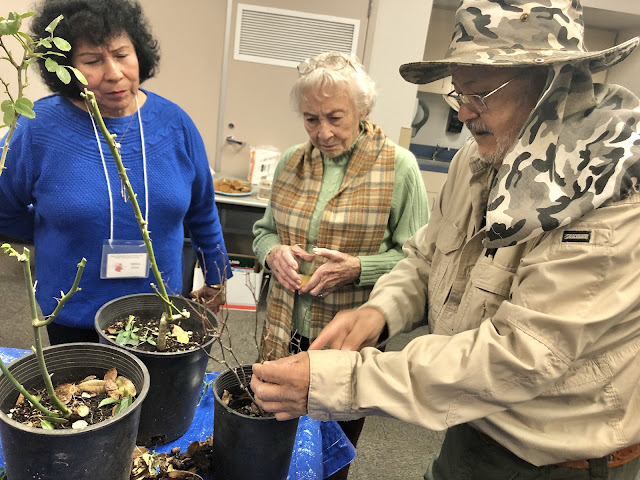
Sierra Foothills Rose Society hosts popular winter workshop

|
|
During the hands-on part of a pre-pandemic Winter Rose Care Workshop, Baldo Villegas, right, demonstrates pruning techniques. This year's free workshop will be Saturday at the Orangevale Grange. Masks are required. (Photo: Kathy Morrison)
|
Can you prune a full-size rose bush in three minutes – or less? Baldo Villegas can – and he’ll show you how.
Baldo’s super-fast pruning method is one of the highlights of Saturday’s annual Winter Rose Care Workshop, presented by the Sierra Foothills Rose Society. This year’s workshop will be held in a new location: Orangevale Grange Auditorium, 5807 Walnut Ave., Orangevale. Admission is free; no advanced registration necessary.
The new site will allow for more social distancing. To comply with pandemic precautions, participants will be required to wear face masks.
Set for 9 a.m. to 1 p.m. Jan. 15, the workshop is designed for both new and experienced rose lovers. Learn the basics or refresh your skills.

|
|
Baldo Villegas knows roses -- and their
pests. (Photo courtesy
Sierra Foothills Rose Society)
|
At 10 a.m., participants will get a chance at hands-on experience with groups devoted to pruning: hybrid teas and floribundas; old garden roses and polyanthas; shrubs and climbers; and miniatures and mini-floras.
At 10:45 a.m., get ideas on how to incorporate more roses into your landscape. At 11:45 a.m., Baldo – a retired state entomologist and Sacramento’s Bug Man – leads a discussion on controlling pests and disease in the rose garden with time for answering questions. Got a mystery pest? Bring a photo or, better yet, a sample inside a Ziplock-type bag.
Rose questions of all sorts will be welcomed to round out this very full workshop.
Questions? Email Linda Knowles at pathfinderrose@comcast.net.
Comments
0 comments have been posted.Sacramento Digs Gardening to your inbox.
Sites We Like
Garden Checklist for week of April 21
This week there’s plenty to keep gardeners busy. With no rain in the immediate forecast, remember to irrigate any new transplants.
* Weed, weed, weed! Get them before they flower and go to seed.
* April is the last chance to plant citrus trees such as dwarf orange, lemon and kumquat. These trees also look good in landscaping and provide fresh fruit in winter.
* Smell orange blossoms? Feed citrus trees with a low dose of balanced fertilizer (such as 10-10-10) during bloom to help set fruit. Keep an eye out for ants.
* Apply slow-release fertilizer to the lawn.
* Thoroughly clean debris from the bottom of outdoor ponds or fountains.
* Spring brings a flush of rapid growth, and that means your garden is really hungry. Feed shrubs and trees with a slow-release fertilizer. Or mulch with a 1-inch layer of compost.
* Azaleas and camellias looking a little yellow? If leaves are turning yellow between the veins, give them a boost with chelated iron.
* Trim dead flowers but not leaves from spring-flowering bulbs such as daffodils and tulips. Those leaves gather energy to create next year's flowers. Also, give the bulbs a fertilizer boost after bloom.
* Pinch chrysanthemums back to 12 inches for fall flowers. Cut old stems to the ground.
* Mulch around plants to conserve moisture and control weeds.
* From seed, plant beans, beets, cantaloupes, carrots, corn, cucumbers, melons, radishes and squash.
* Plant onion sets.
* In the flower garden, plant seeds for asters, cosmos, celosia, marigolds, salvia, sunflowers and zinnias.
* Transplant petunias, zinnias, geraniums and other summer bloomers.
* Plant perennials and dahlia tubers for summer bloom.
* Mid to late April is about the last chance to plant summer bulbs, such as gladiolus and tuberous begonias.
* Transplant lettuce seedlings. Choose varieties that mature quickly such as loose leaf.